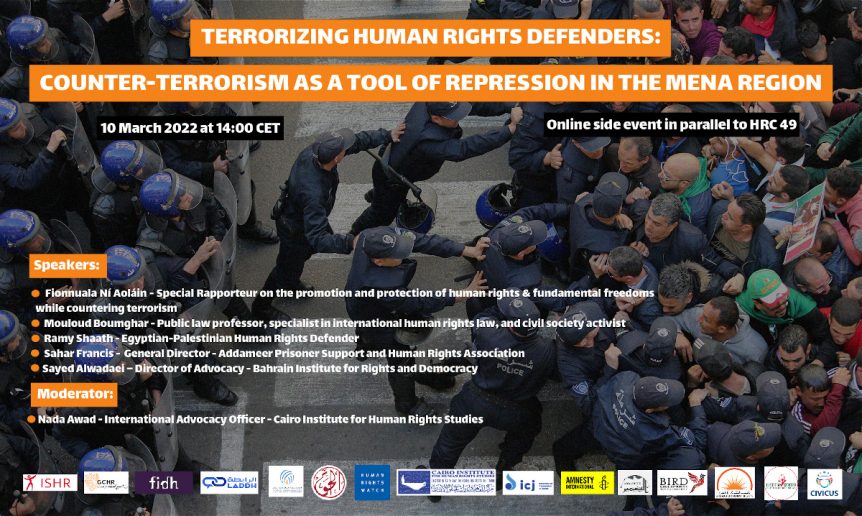On 10 March 2022, the Cairo Institute for Human Rights Studies (CIHRS) and 14 local, regional, and international organizations held an online side event in parallel to the 49th session of the United Nations (UN) Human Rights Council (HRC), entitled “Terrorizing Human Rights Defenders: Counterterrorism as a tool of repression in the MENA region”. The side event was attended by the United Nations Special Rapporteur on the promotion and protection of human rights and fundamental freedoms while countering terrorism, Fionnuala Ní Aoláin, and representatives of UN member states, the OHCHR , and civil society.
The event addressed the alarming trend of governments using counter-terrorism legislation as a pretext to crackdown on fundamental freedoms in the Middle East and North Africa (MENA) region – specifically in Egypt, Algeria, Palestine, and Bahrain – and its far-reaching ramifications on public sphere and civil society’s ability to carry out its work. Four speakers gave voice to this trend by sharing their experiences: Egyptian-Palestinian human rights defender Ramy Shaath, former detainee in Egyptian prisons; Sahar Francis, Director of Addameer Prisoner Support and Human Rights Association; Sayed Al-Wadaei, Advocacy Director at the Bahrain Institute for Rights and Democracy; and Jamila Al-Wakeel, Algerian journalist and human rights activist. The side event was moderated by Nada Awad, International Advocacy Officer at the Cairo Institute for Human Rights Studies.
Speakers explained how governments continue to exploit counter-terrorism legislation as a tool to repress and silence. They provided examples from their own experiences that illustrated the human rights cost of counterterrorism’s misuse in the four countries. The vague and overly-broad provisions of counterterrorism legislation has facilitated the mischaracterization of independent and legitimate human rights work as terrorism, leading to the arrest of countless individuals over the years on unfounded terrorism charges, especially targeting human rights defenders (HRDs), activists, journalists, and lawyers.
Special Rapporteur (SR) Ní Aoláin emphasized that the misuse of terrorism laws to retaliate against dissidents and opponents is a vast global issue rather than specific to any state. The examples given by the speakers and the SR’s experience from 2017 substantiate the allegation that governments in the MENA region and globally are escalating their use of counterterrorism measures not with the intent of eliminating terrorism but rather with the intent of quelling opposition to state repression or authoritarianism, as they deploy counterterrorism laws to especially target human rights defenders, journalists, civil society organizations, and other critics of state policy. This misuse, the SR noted, undermines or blocks the potential paths to peaceful political solutions or change.
Speakers provided recommendations to stakeholders, including to “affirm the precise definition of counter-terrorism as adopted by the Security Council resolution 1566, and take into account the model definition by the mandate”, as well as to rescind laws and regulations that criminalize the work of civil society. Speakers also underscored the key role of international pressure in ensuring the release of arbitrarily detained individuals. The Special Rapporteur stressed that protecting security must go hand-in-hand with international human rights laws and standards.
The side event concluded by underscoring the need for member states at the HRC 49 to firmly condemn the misuse of counterterrorism legislation and to call on states to drop all unfounded terrorism charges against organizations, HRDs, journalists, and peaceful political dissidents. Member states should further proactively press for the release of persons arbitrarily detained under terrorism charges. At the UN level, governments that systematically misuse counter-terrorism should not be given leading roles within the UN counter-terrorism architecture, and efforts by such states to weaken international human rights standards within this framework must be strongly opposed.
Share this Post

